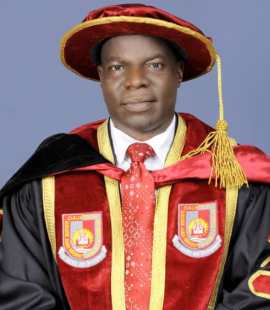*Calls for establishment of National Flood Research center in Kogi
A university Don, professor Temi Ologunrisa has advocated for the integration of disaster management plans into the National Development plans to mitigate the recurrence of flooding that has been ravaging some parts of the country.
This is as he advised for the collaboration among the countries within the Niger and Benue trough in order to fight the menace rather than leaving the bulk effects to Nigeria which is at the bed of the trough.
The erudite professor , who is the vice chancellor, Ondo state university of Science and Technology Okitipupa, gave the advice in a lead paper he presented at a two day seminar on “Flood and Sustainable Development” organised by the Federal University Lokoja, on Wednesday in Lokoja.
Professor Ologunrisa challenged the government at all levels and her agencies in the management of disasters to exchange ideas that will mitigate on the impact of flood on the nation’s ecosystem as it affect sustainable development goals.
He said flood is a natural disaster which is bound to occur, hence, a national flood Research center should be established in Lokoja for an exchange of ideals where international and sub National scholars and stakeholders will converge to proffer solutions to the problem.
He lamented at the absence of workable and reliable data that will be used for further research in the fight against climate change.
According to him, flooding as a natural disaster is inevitable and as such, the needs to build resilience,, risk management, and hazards reduction have becomes imperative for the country to surmount the challenges.
He listed climate change which could be in form of flood and drought, abuse of town or community planning where people build on land set backs and indiscriminate dumping of refuse with its consequences on Agricultural and Social economic potentials of the country.
He explained that the hydro climatology of flood which often occurred between the months of August and October could be mitigated if more dams are built on the Benue and Niger trough, saying the fifteen aging dams are not for the country to fight flooding.
He called on states to build into their annual budgets, flood and other disasters’ contingency fund to assist in solving the menace as against the fire brigade approach whenever it occurred.
While calling on the communities for cooperation by observing tips for early warning signals , calls for strengthening of central Disaster data base for institutions to leverage on when it happened.
Earlier , the chief convener, the vice chancellor of FUL, professor Olayemi Akinwumi said the theme of this Conference, “Flood and Sustainable Development,” highlights the critical issue that threatens the lives and livelihoods of millions of people living in the Niger – Benue Trough extending to the Coastal region of Nigeria.
“This conference is an important milestone not only for our Institution, as we are hosting the confluence of the two great Rivers in the country.The Niger and the Benue, where the name of the State was derived, but for our country as a whole.
“The Niger-Benue trough, which spans across several States in Nigeria, has experienced devastating floods that have caused loss of lives and destruction of properties as witnessed in the years 2012 and 2022.
“As a University, we think it is necessary and crucial to come together and discuss the causes, effects, and Solutions to this recurring natural disaster.
“I believe that through this conference, we will gain a better understanding of the ecological and environmental factors that contribute to floods in the Niger-Benue trough. We also hope to study how human actions inadvertently or directly cause these floods and how we can put measures in place to ensure that they do not happen in the future.
“Education and capacity-building are paramount in empowering communities to cope with floods. By providing access to knowledge, training, and resources, we can enhance the preparedness and response capabilities of individuals and communities. These include educating people about flood risks, teaching them essential skills in disaster management, and fostering a culture of resilience and adaptation.
“As part of the strategic reasoning of the Federal University Lokoja, it is our hope that this Conference would provide the basis for pushing for the establishment of a Centre here in Lokoja that would support research on various aspects of flooding.
“The University is prepared to partner with individuals and Institutions towards the realization of such Centre. The envisaged research Centre should be such that would serve the need of the West African sub-region” he stated.
I




